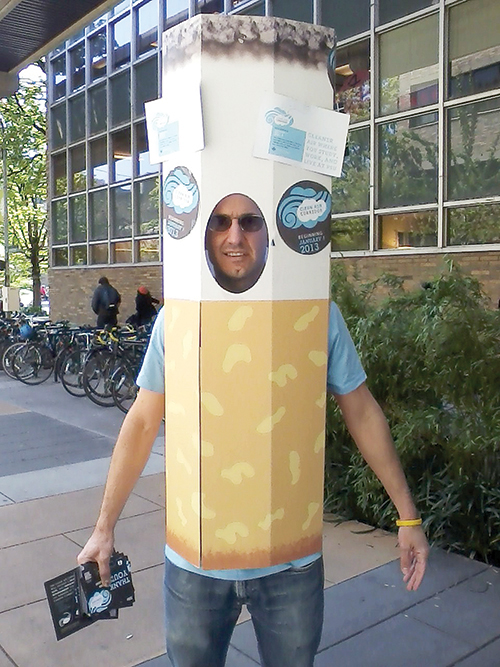
The Clean Air Corridor, a pollution-free zone that runs between the Park Blocks and Southwest Broadway from Lincoln Hall to Shattuck Hall, has been met with steadily increasing compliance since its Jan. 1 implementation.
The Portland State Campus Public Safety Office officers have not been issuing citations, but they have been warning students caught violating the smoking ban.
“In the first 30 days we spoke with 164 students who were smoking in the Clean Air Corridors and advised them about the program and about smoking cessation options,” CPSO Chief Phillip Zerzan said.
He also said the number of students they’ve advised has decreased significantly in each of the subsequent 30-day periods.
There are no longer designated smoking areas on campus, and numerous locations—including all areas near building entrances, the Urban Center and TriMet stops—are posted no-smoking zones.
Director of Campus Recreation Alex Accetta has been working closely with the program since its inception. “We did a lot early on with people,” he said. “Mostly our observation is we’re getting good compliance. Most we’ve talked to just didn’t know.”
The Clean Air Corridor is just the beginning of a comprehensive, campus-wide ban on smoking.
“Eventually, the Park Blocks are going to go smoke-free,” Accetta said, adding that PSU has accepted the U.S. Department of Health’s Fresh Air Campus Challenge and is committed to being a smoke-free campus by 2016.
“It’s definitely a culture change,” Accetta said. Overall, he characterizes reception of the policy as positive. “Smokers want to be respectful. It’s not about shaming smokers. It’s about creating a smoke-free environment.”
According to the Centers for Disease Control, tobacco use is the leading preventable cause of death in the United States, causing one of every five deaths in the nation annually.
In addition to the general health risks of exposure to secondhand smoke, which the CDC estimates is responsible for almost 50,000 deaths a year in the U.S., some students, staff and faculty live with conditions that are aggravated by exposure to tobacco smoke and other airborne pollutants.
Sabrina McCoy, a senior majoring in film, said, “As someone who lives with asthma and allergies, this will make walking through campus a much more pleasant experience.”
At the same time, McCoy expressed concern that antismoking measures on campus could unduly infringe on the rights of smokers. “I hope the administration will still find ways to accommodate those who choose to smoke,” she said.
As part of Monday’s Earth Day celebration in the Park Blocks, Patrick Poletti, a lifeguard with Campus Recreation, passed out information on the Clean Air Corridor program while dressed as a giant cigarette.
“When the costumes came in, I volunteered to wear one,” he said. “Our focus is on education. We have no authority to issue citations.”
He said that most of the people he has encountered smoking in the Clean Air Corridor were simply unaware of the area’s designation as a no-smoking zone.
Angela Abel, the marketing and communication coordinator for the Center for Student Health and Counseling, said SHAC offers support for students who want to kick the habit. She encouraged students to take advantage of the smoking cessation resources available to them.
“There’s a limited amount of one-on-one counseling available. If students have the extra insurance (required for all students attending at least half-time who do not have comparable coverage through another source), they qualify for the Quit and Fit program.”

